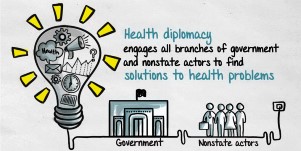Cairo, 7 May 2016 – The WHO Regional Office for the Eastern Mediterranean held its fifth annual seminar on health diplomacy from 7 to 8 May 2016 in Cairo, Egypt. The seminar was first convened in 2012 as a regional initiative bringing together representatives of ministries of health and foreign affairs to explore the multidimensional relationships between health and foreign policy.
It has since evolved into an annual event, which, this year, hosted more than 70 ministers of health, senior officials from ministries of foreign affairs and ministries of health, ambassadors, representatives of United Nations missions in Geneva, deans of diplomatic institutes, parliamentarians and global health diplomacy experts from around the world.
The seminar provides a unique platform to discuss contemporary health diplomacy concepts and key global health issues. “Whether it’s a WHO Governing Bodies meeting, such as the World Health Assembly or Executive Board, United Nations General Assembly sessions or other international fora, often it’s foreign policy that negotiates and influences health-related treaties and agreements,” said WHO's Regional Director Dr Ala Alwan. The seminar aims to expand a network of health diplomacy experts and strengthen the capacity of Member States in this area.
“We need to realize that important progress cannot be made in addressing the key challenges to health development in this Region, unless non-health sectors are seriously engaged,” highlighted Dr Alwan.
The Region is witnessing unprecedented health crises in terms of number and magnitude, overburdening already stretched health systems. These crises have further led to forced population displacement, which has crossed national and regional borders, affecting national and global health. No country is immune to cross-border importation of diseases. Health diplomacy has a major role in emergency response and humanitarian reform.
The health commitments included in various international agreements and declarations, including the Sustainable Development Goals and the United Nations Political Declaration n the Prevention and Control of Non-communicable Diseases, cannot be met without a whole-of-government approach and cooperation across borders.
Health diplomacy has never been more relevant than it is today.
Related links
Health diplomacy: framing diplomacy through a health lens
Read more about health diplomacy



